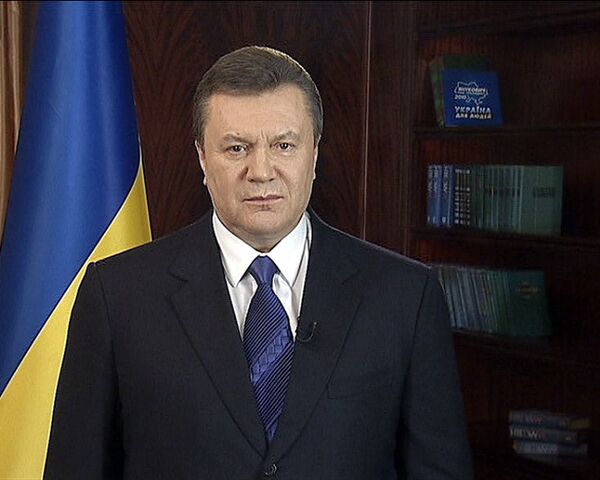Ukraine's president-elect Viktor Yanukovych could author a philosophic essay on the fickleness of human nature. State leaders, organizations and analysts who only recently referred to him as the Kremlin's puppet, an election forger, a twice-convicted violent felon and lumpen victor, now seem happy to congratulate him on his victory. At the very least they recognize him as the president of Ukraine and are able to accept him as he is for the sake of international cooperation.
The reason for this change of heart is best explained by a popular saying, "Victory has a thousand fathers but defeat is an orphan." When the Orange Revolution unfolded in 2004-2005 and Yanukovych was labeled the Kremlin's puppet in all the media from Vancouver to Warsaw, the West was unanimous in its determination to prevent him from winning an election.
However, the Orange government made such a mess that the West simply could not continue hailing it as heroes and demonizing Yanukovych. Recently dubbed the embodiment of evil by Poland's newspaper Gazeta Wyborcza, Yanukovych has been miraculously transformed into an ordinary politician.
However, politicians cannot do what the media can get away with. Only very defiant leaders like Venezuelan President Hugo Chavez or Iranian President Mahmoud Ahmadinejad dare to call the prime minister of an independent state a puppet if they are aware that no one else shares their opinion. The leaders of the so-called free countries will never allow themselves such luxury unless they know they'll be supported by their allies. But if they dare do so, they will never spare words abusing their victim.
Dutch Prime Minister Jan Peter Balkenende expressed his "sincere congratulations" to Yanukovych, adding that "I am confident that relations between our two countries will continue to be constructive and mutually beneficial." Was that sarcasm? On the day after the November 2004 election, Balkenende, who held the EU presidency at the time, called Verkhovna Rada Speaker Volodymyr Lytvyn to express his concern over the results of the Ukrainian election, which "do not reflect the electoral behavior of the people." Naturally, Balkenende was not alone in his concern, which was reiterated by the foreign ministers of Germany, Britain and Poland.
According to Ukraine's Central Election Commission, this time Yanukovych's result was as high as in 2004, if measured in percentage points. This might at least cast doubt on the accusations made six years ago. However, Balkenende and his proponents asserted that the will of all Ukrainians was overridden and didn't want to hear any objections from anyone, including the then Russian President Vladimir Putin, who attended a summit with Balkenende.
This time President of the European Parliament Jerzy Buzek congratulated Yanukovych two days earlier than the Russian president. It should be reminded that in 2004 Buzek was furious when he found out about Putin's ostensibly early congratulations to Yanukovych, which were expressed two days from the official announcement of preliminary results. Putin was accused of backing Yanukovych and his party.
In 2005 Buzek, who was an ordinary member of the European Parliament, openly called on all EU countries to support the Bloc of Yulia Tymoshenko (BYuT) in the parliamentary elections to avert Ukraine's "flirtation" with "undemocratic Russia."
BYuT lost those and subsequent parliamentary elections to the Party of Regions, and now one can see Buzek giving a friendly hug to Yanukovych at official meetings promising to smooth Ukraine's accession to the EU. Buzek seems to forget that in 2004 his Polish colleagues in the European Parliament compared Ukrainian elections with North Korea's. The distance between East Asia and Central Europe can sometimes be amazingly short.
Furthermore, former British Prime Minister Margaret Thatcher asserted in 2004 that Yanukovych's victory would drop an iron curtain between Ukraine and the rest of Europe. These words were taken seriously and commented on, as opposed to Thatcher's criticism of the EU, which was declared senile dementia.
Journalists tend to be far less flexible than politicians, but they excel in making colorful and convincing arguments. In his recent feature for the Guardian, British historian Timothy Garton Ash, who is considered the best expert on Central and Eastern Europe in Russophobic circles, called Yanukovych a lumpen victor. "The only silver lining is that, like so many other leaden and inarticulate leaders in the post-communist world, he will surely mobilize young Ukrainians in embarrassment, disgust and ridicule. Anyway, Yanukovych is the best Ukrainian president we've got. We have to work with him," he stated bluntly. This is the much vaunted British understatement and refined expert opinion.
Former Polish Prime Minister Leszek Miller seems to be the only politician in Central and East Europe to have congratulated Yanukovych sincerely. He reminded the readers of his blog that when the EU closed the Polish border to Ukrainians in 2003, Prime Minister Yanukovych refrained from imposing visa restrictions on Poland. A friend in need, not in victory, is a friend indeed.
The opinions expressed in this article are the author's and do not necessarily represent those of RIA Novosti.
MOSCOW. (RIA Novosti commentator Dmitry Babich)



